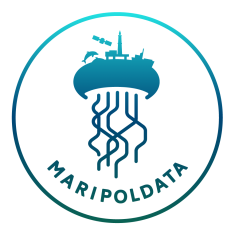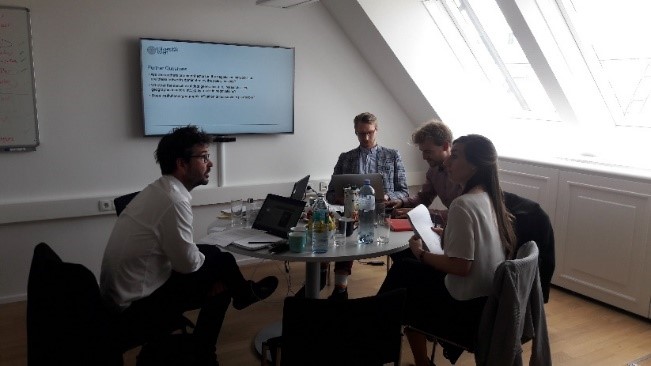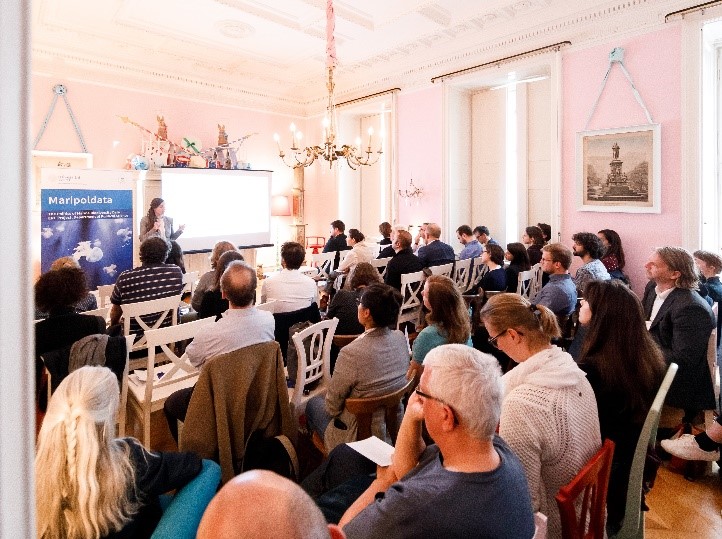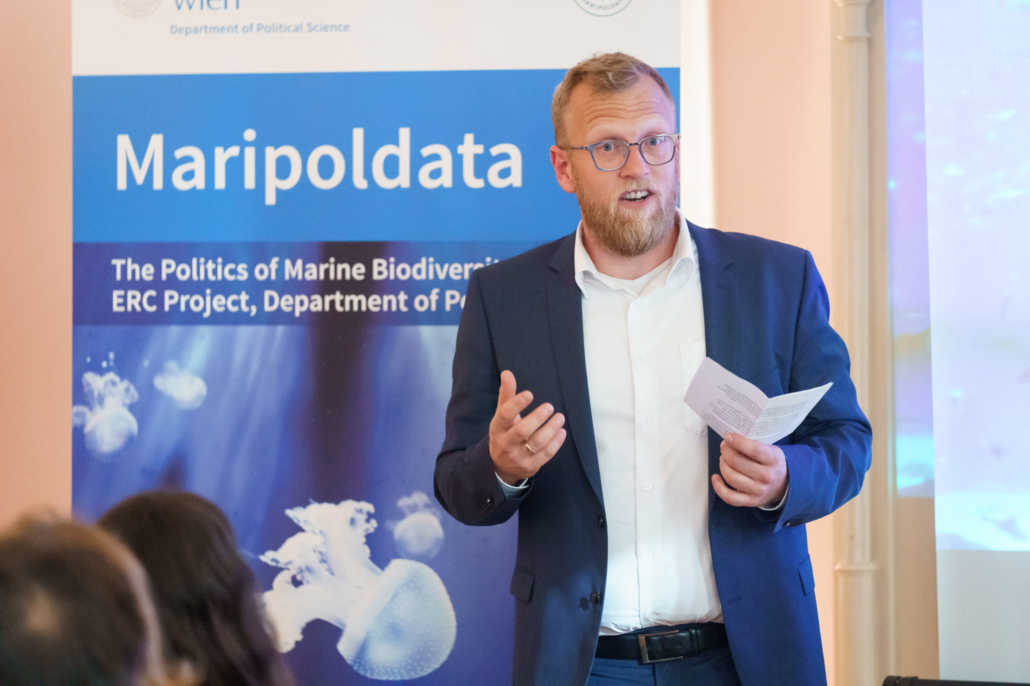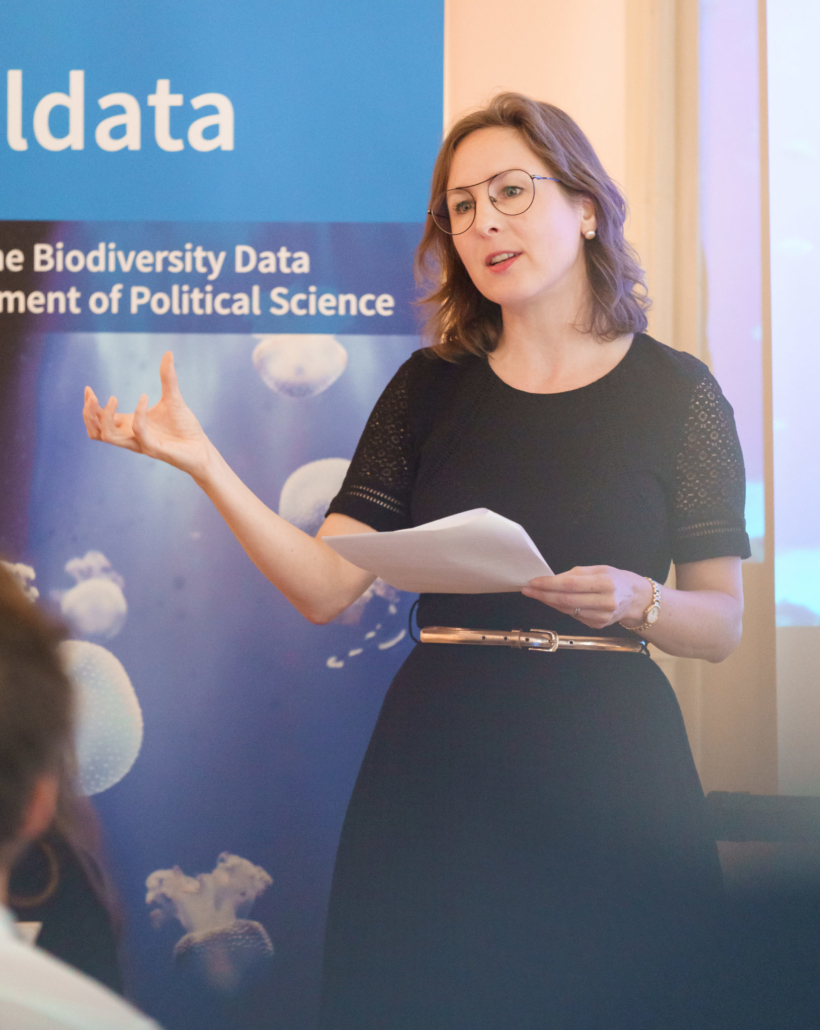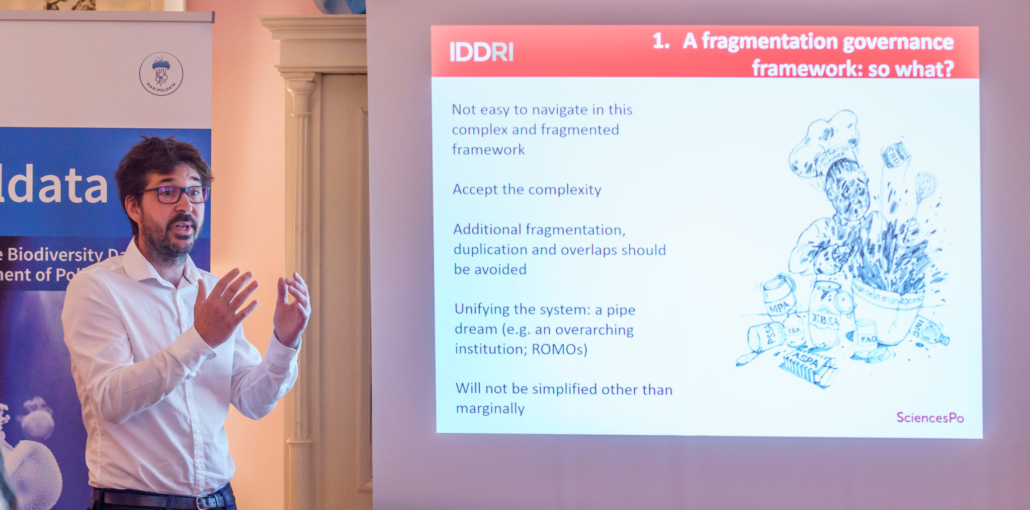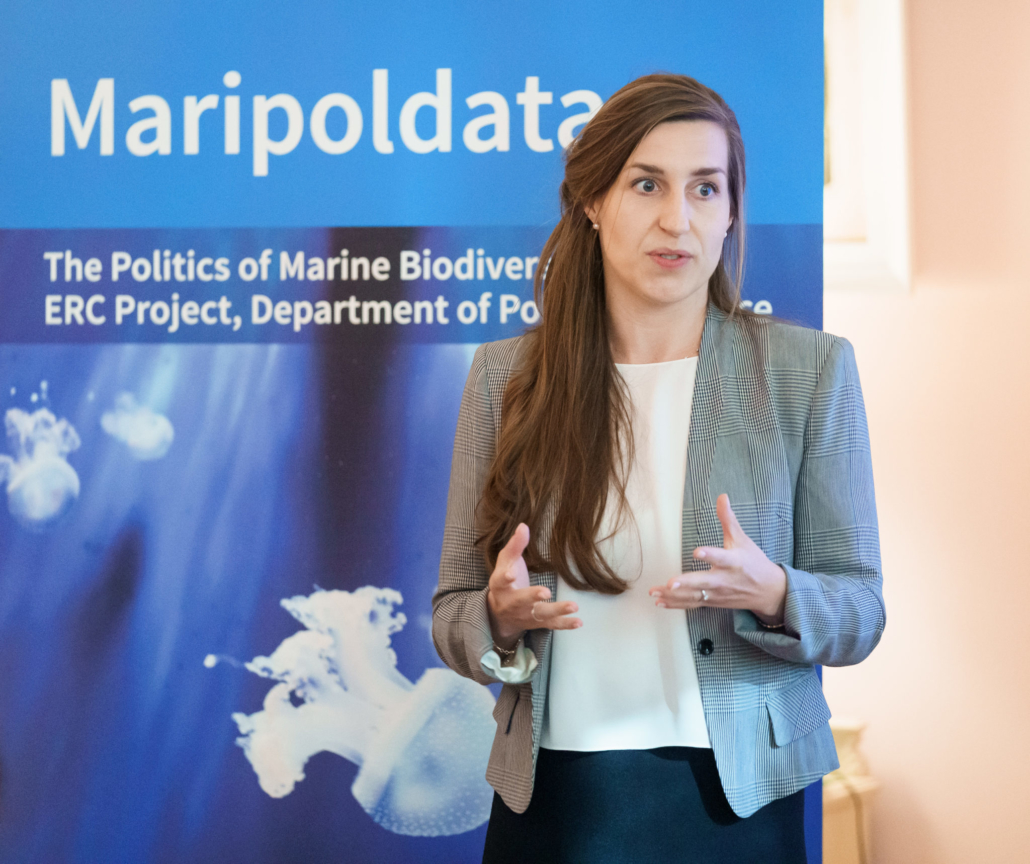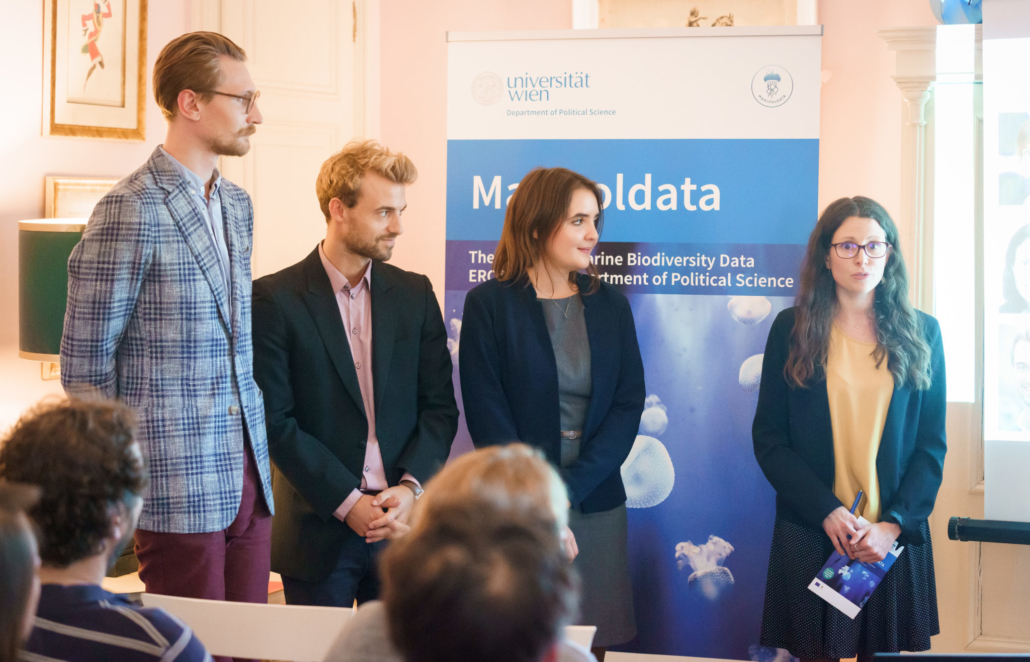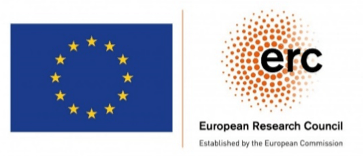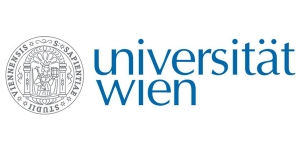Off to a great start
On the 21st of May, MARIPOLDATA had its project launch. The event was open to the public and attracted over 50 people from academia, ministries and non-governmental organisations. Dr. Julien Rochette from the Institute for Sustainable Development and International Relations (IDDRI) shared his expertise on ocean governance and highlighted the need for a new legal framework to account for updates in ocean science and the integration of new scientific findings to protect our ocean. Before the event, a workshop with Dr. Julien Rochette was an opportunity for the MARIPOLDATA team to exchange experiences and ideas on how to study science-policy interrelations in marine biodiversity politics.
Expert-Workshop with Dr Julien Rochette (IDDRI)
The day of the kick-off started with a workshop with Dr. Julien Rochette, from the Institute for Sustainable Development and International Relations (IDDRI). He is coordinating a team specialised in ocean governance on the regional level. For the MARIPOLDATA team, this was a great opportunity to reflect on first observations from the BBNJ negotiations in April, discuss concepts, ideas and current issues related to the EBSAs (Ecologically and Biologically Significant Areas), develop ideas on how to conceptualise and understand the role of science in international relations, as well as exchange experiences on which methodology to use to understand the field of marine biodiversity research.
Throughout the day, the discussions ranged from broad concepts and framings of marine biodiversity data to specific methodological approaches. The workshop posed important questions, some of which the MARIPOLDATA team will dedicate themselves to in the process of the project: How does science influence international relations and in particular, the negotiations regarding marine biodiversity? Who are the scientists and which avenues do they use to communicate their findings? What is the role of scientists – are they supposed to exclusively provide scientific data, or is their responsibility also the interpretation of their results, policy recommendation and implementation, or even decision-making? What do we mean by scientific data? And what do we know about indigenous and local knowledge and how does this play a role when it comes to marine biodiversity protection? What data is relevant in international attempts to protect marine biodiversity and how can this data be communicated, governed and shared? These and many other questions will be relevant in the work of MARIPOLDATA.
The Project Launch
In the evening, the project was presented to a diverse audience of ministry representatives, NGOs, different university departments and research institutes, including different disciplines of social and natural sciences. The aim was to introduce MARIPOLDATA research aims and objectives and to reach out to a future network.
Not only the audience came from a wide variety of academic backgrounds and institutions – but also the event’s speakers:
In the welcome address, Univ.-Prof. Dr. Hajo Boomgarden (Dean of the Faculty of Social Science) emphasised the relevance and importance of MARIPOLDATAs research and highlighted that the project has great potential in conducting ground-breaking research through the combination of qualitative and quantitative methods within an interdisciplinary team on a very current topic in which research is lacking. This project is an example of why social sciences research is important to address environmental problems and contribute to issues that seem to exclusively be of technical nature.
Our ocean constitutes one of the global commons, as they can only be governed with cooperation among all states. Univ. Prof. Dr. Barbara Prainsack (Deputy Head of the Department of Political Science) provided the audience with an overview of the history of global commons. She gave an introduction of the tragedy of the commons (Hardin) and ended on the positive note that not all human behaviour is self-interested and that international cooperation for the protection of global commons is possible (Ostrom). And indeed, international cooperation will be needed in the negotiations of the new legally binding treaty on the conservation and sustainable use of marine biological diversity of areas beyond national jurisdiction (BBNJ), for the global commons to be protected.
Currently, human activities impacting the health of our ocean threaten the global commons. Dr. Julien Rochette (IDDRI) presented the challenges our ocean faces, including plastic pollution, tourism on coastlines, deep seabed mining, over-fishing and ocean acidification. Increasing efforts to protect the ocean are underway through a complex ocean governance framework, including overarching UN Sustainability Development Goals, various UN bodies, sectoral and regional conventions, as well regional fisheries organisations. After mapping the fragmented ocean governance framework, he highlighted the main challenge is implementation. There is the need to protect “the neglected half of our planet”, referring to the High Seas, as they make up 45% of the Earth’s surface and 64% of the world’s oceans. Various instruments already exist to protect the ocean, however, provisions of the law of the sea were developed on the basis of a little understanding of marine biodiversity in the deep sea and the open ocean. How can a global instrument that was developed in a time when we thought of the sea-floor as a desert account for protecting the incredible marine biodiversity and ecosystems we now know exist? There is the need for a new legal framework that accounts for the updated ocean science and simultaneously acknowledges that there are still many unknowns and data gaps that need to be filled. He further argues that “we need to connect the dots” and therefore understand that the ocean governance framework on its own is not sufficient but requires to be anchored to other conventions, such as conventions on climate change (COP) and biodiversity (CBD).
The lack of scientific knowledge to fully understand the deep sea and marine biodiversity beyond areas of national jurisdiction (ABNJ) was also highlighted by Julie Rigaud from the Intergovernmental Oceanographic Commission of UNESCO, who joined the kick-off event with a video message. She presented on the role of the UN decade in the science-policy interface and emphasised the need for ocean science and data collection and sharing and how current UN goals seek to develop knowledge, build infrastructures and foster partnerships.
Ass.-Prof. Dr. Alice Vadrot has always had the ambition to understand this relationship between science, policy and politics. Her idea for the research project MARIPOLDATA now makes it possible to investigate this question by analysing ongoing negotiations for marine biodiversity protection. MARIPOLDATA is important for progressing international politics and marine biodiversity protection because it addresses challenges and opportunities of the science-policy interface, new technological developments, digital infrastructures and data sharing. Combining global perspectives with regional and local needs and acknowledging global inequalities related to science and data infrastructures makes the research project unique and highly relevant in understanding new power relations in world politics. The project aims to innovate methodologies and concepts for studying the role of science in ocean politics and to create networks between scientists, policy makers and practitioners.
In the following years of the project, the MARIPOLDATA team: Post-Doc Petro Tolochko, the two PhD students Arne Langlet and Ina Tessnow-von Wysocki, and the Research Administrator Emmanuelle Brogat will support her in answering the questions: How are negotiations shaped by science? What is the science that shapes the negotiations? How does scientific capability shape negotiating positions?
The project includes an investigation of the emergence of BBNJ, an analysis of marine biodiversity expertise, an examination of marine biodiversity data in international politics and a comparison of different national and regional case studies. MARIPOLDATA’s aim is to identify how governments use and contest scientific and technical knowledge, to conceptualise new forms of power in international politics and to analyse inequalities related to the distribution of scientific and technical knowledge and their influence on governments’ positions in international negotiations. This will identify the interaction between science, politics and policy and transform our understanding of the role of data and monitoring in governing the ocean.
Considering the diverse group of people from different academic fields, it was no surprise that the presentations were followed by a wave of interesting questions and comments from the audience, including general questions on approaches to the project and specific questions on the methodology of the case studies. One attendee raised the question whether international law was a focus area of the project. While being closely linked to international law through the analysis of the intergovernmental negotiations at the United Nations, research will not be conducted through the lens of international law. Regarding the EU case study, the official EU position in the negotiations will be important, as well as EU-wide systems for marine biodiversity monitoring and data collection.
After the round of questions and answers, the venue turned into a space for dialogue between lawyers, marine biologists, policy makers, university professors, social scientists, diplomats and environmental activists from various countries, including Austria, France, Germany, Spain, Portugal, the UK, Brazil, Mexico, and the US. The event was held in English, but it did not take long for other languages to be heard over the vegetarian buffet. This event was more than simply a kick-off for a new research project – it was an evening of exchange of ideas and already the beginning of new collaborations in scientific research and the protection of marine biodiversity and our ocean.
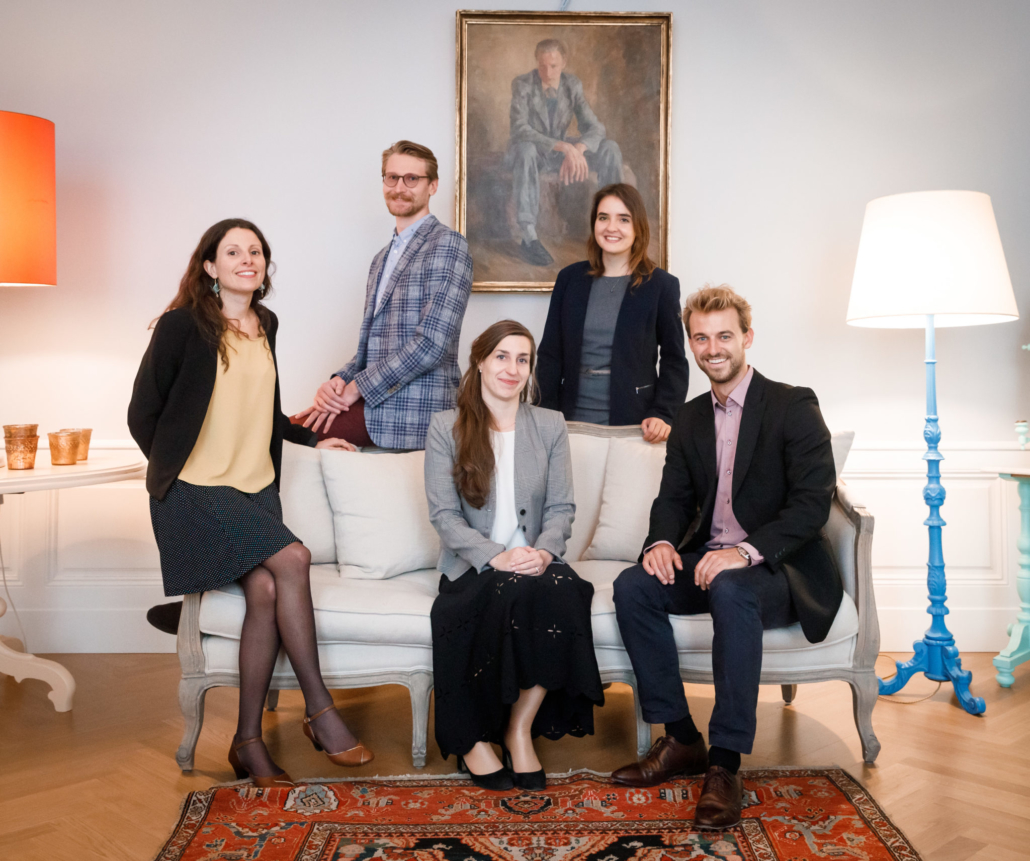
MARIPOLDATA Team: Emmanuelle Brogat, Petro Tolochko, Alice Vadrot, Ina Tessnow-von Wysocki, Arne Langlet
